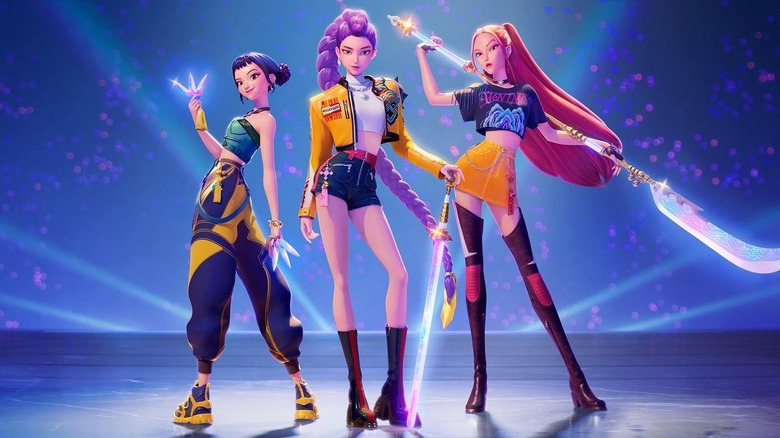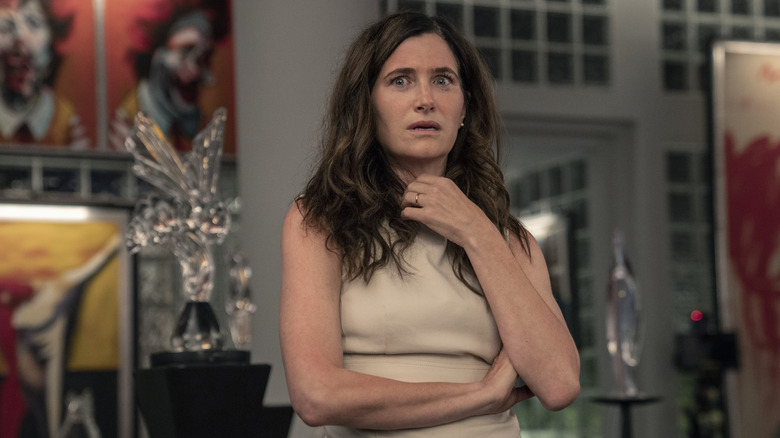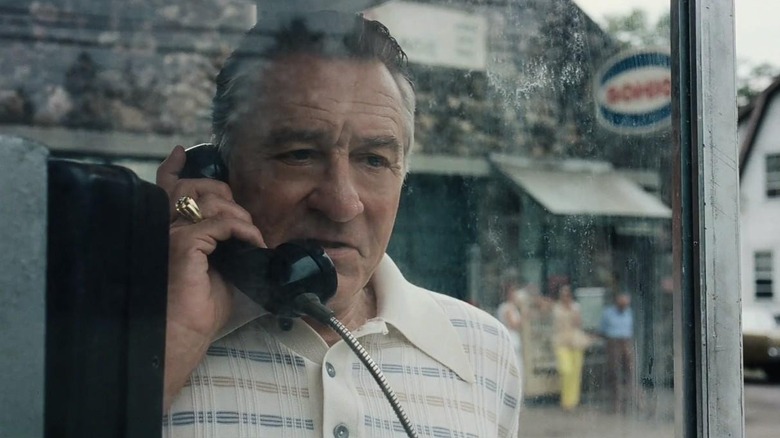Why AMC Won't Play Netflix Movies Like KPop Demon Hunters
AMC is the biggest movie theater chain in the world. As such, it is an enormously important part of the overall ecosystem that supports the movie business as we know it. That's why it might come as a surprise that they didn't play "KPop Demon Hunters," which recently made $19.2 million at the box office in just two days, topping the charts on one of the final weekends of the summer in a major surprise. The animated smash hit originated on Netflix though and that, for AMC, is a sticking point ... at least as things currently exist.
On a recent episode of "The Town" podcast, AMC Theatres CEO Adam Aron discussed the chain's decision to not play "KPop Demon Hunters," in addition to other Netflix movies that occasionally arrive in theaters for a brief time. In this case, it was a two-day-only, sing-along event. In other cases, it's brief engagements just ahead of a film's streaming release. For Aron, though, that's the issue, as AMC fought hard for a 45-day theatrical window with other studios:
"I don't want to be a foe of Netflix. Netflix is a great company. I would love to play Netflix movies in our theaters. But, going back to principles, this past weekend, and KPop [Demon Hunters], we need a respectable theatrical window because if I do something for Netflix, a two-week window or something, how do I say to Disney, or Warner Bros., or Sony, or Paramount, 'Yeah, but for you it's 45 days.' It's not right."
While not every movie stays in theaters for 45 days, there are agreements in place. Without getting into the weeds on all of that, essentially, AMC and other theater chains had to work with Hollywood at large on a model for theatrical movies that worked for theaters and studios in the aftermath of the pandemic. Movies going to major streaming services on the same day they hit theaters wasn't viable.
Netflix and AMC have very different motivations
For Aron, it comes down to the longer term health of the theatrical business, as he sees it. Netflix's Ted Sarandos, meanwhile, has called theaters "outdated," while using them when advantageous, such as with "KPop Demon Hunters," which had already been a massive hit on the streamer for weeks before the limited theatrical release. Aron doesn't feel it's worth playing by a different set of rules for Netflix, even if chains like Regal and Cinemark are willing to from time to time. Rather, he wants them to see the value in theatrical releases. As Aron explained:
"Nothing would make me happier than for Netflix to want to show movies theatrically. We have been trying for years now to convince Netflix that the most successful movies on streaming services are those which have had a robust theatrical release."
"I think we won that argument with everybody but at Netflix," Aron added. "We've tried. I personally spent hours and hours trying to get 'The Irishman' into theaters."
To Aron's point, Netflix was in negotiations with AMC and other chains for Martin Scorsese's "The Irishman" in 2019, attempting to come to terms on a broader theatrical release. It never came together, and it all had to do with the exclusivity window. Aron wasn't willing to dig into what went down behind the scenes, but he lamented that they couldn't get a deal done:
"At the end of the day, there was no corporate agreement between Netflix and AMC as to what the window would be, what the film rent would be, etc., and it didn't happen. And it's a shame."
"The closest we got was the 'Knives Out' sequel, 'Glass Onion,' which we actually played hoping that it would convince Netflix that they would make money from it, and it would increase the ratings of 'Glass Onion' on its streaming platform," Aron further explained.
Indeed, "Glass Onion" played in theaters in 2022 and theaters asked Netflix to let it play longer. Netflix rejected those pleas, despite the fact that it made over/under $15 million during its week-long run. Unfortunately, Netflix doesn't report official box office grosses, which further complicates matters.
AMC wants to be in business with Netflix, but only under the right circumstances
As for Aron's argument that movies released in theaters tend to perform better on streaming, the evidence is overwhelming on that front. That's why "Moana 2" and "Lilo & Stitch" both shifted from Disney+ to theaters, each making over $1 billion at the box office and raising overall awareness for the existence of those films. Even theatrical misfires like "Abigail" tend to find bigger audiences once they arrive on streaming.
Whether or not Aron can convince Netflix that there is money to be made for everyone should the streamer decide to commit to more meaningful theatrical releases remains to be seen. That said, Netflix seems pretty staunch in its stance that streaming is the future. This also doesn't mean there won't be exceptions. AMC has already committed to playing Greta Gerwig's new "Narnia" movie when it arrives on IMAX next year. But as Aron said on the podcast, that has more to do with IMAX than Netflix:
"That is yet another carrot out to Netflix. We didn't do it so much for Netflix, we did it for IMAX. We're very close to IMAX and this was an important project for IMAX, and as a favor to the CEO of IMAX I said, 'Yes, we'll play Narnia.'"
For Aron and AMC, the motivations are clear. The summer box office came in well below the industry's expectations. Audiences are increasingly favoring watching movies at home. AMC has no real motivation to help Netflix when they're not doing much to help theaters. There needs to be more of a mutual exchange, in Aron's view. But streamers and movie theaters can learn to co-exist.
"My hat's off to Apple, I think they did a great job with 'F1,'" Aron also said. Brad Pitt's "F1" is the biggest original movie of 2025 with $614 million globally. It will then enjoy a healthy life on Apple TV+. Everybody wins. Could something similar have happened with "KPop Demon Hunters" or "Happy Gilmore 2?" Aron would certainly like to find out.


